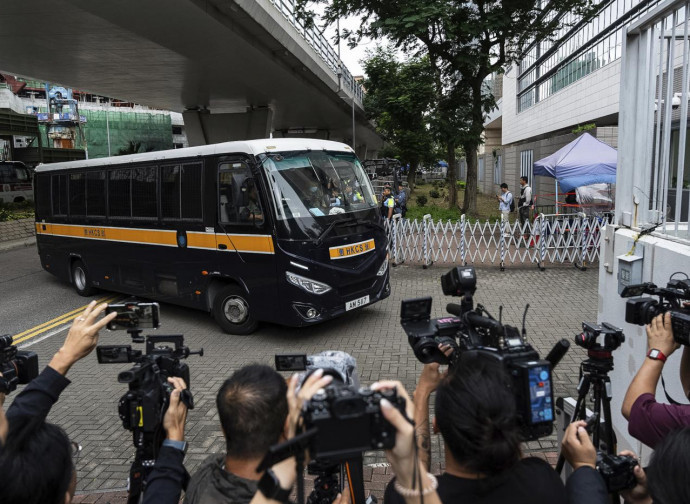China looms: 14 convictions in Hong Kong for subversion
The trial of 47 pro-democracy activists arrested in 2020, ended yesterday for the first 14 convictions for subversion, but also with two acquittals. Beijing's new law starts to be applied in Hong Kong.

On May 30, 14 pro-democracy activists in Hong Kong were charged as guilty by the pro-Beijing Hong Kong court in a move that critics slam as a huge blow to the city’s freedoms and status as a financial hub, according to Reuters.
This landmark court decision came more than three years after the Hong Kong police arrested 47 democrats across the city, accusing them of conspiracy to commit subversion under a draconian and controversial national security law enforced by the Chinese Communist Party (CCP). Based on a report by Hong Kong Free Press, these defendants were charged for allegedly plotting to use legislative powers to indiscriminately veto bills – such as the budget – eventually prompting the chief executive to step down.
Notably, these 14 accused were among 16 defendants on trial, with the remaining two, Lee Yue-shun and Lawrence Lau, getting acquitted and released, Radio Free Asia (RFA) reported. The same article added that the remaining 31 defendants in the so-called 47 trial had already pleaded guilty to the charge of “conspiracy to commit subversion,” a charge which carries a maximum penalty of life in prison. Those charged as guilty were taken promptly into custody.
The case revolves around an unofficial primary election conducted in July 2020 which the defendants said was meant to select the best candidates to win a majority in local elections. On the other hand, prosecutors said the 47 wanted to undermine the city’s legislature by winning the power to veto budgets, RFA reported. Moreover, the two released were the first two tried under the Beijing-imposed national security law to be freed, Hong Kong Free Press reported.
In statements to the media following his acquittal, Lau voiced his thanksgiving to all those who had “shown their big hearts and concerns,” before elaborating that “there are still other defendants in this case warranting our concern and even love.” Lau, a barrister who represented himself during trial, added: “if there is any star in this case, this judgment should be the star. It [shows] the jurisprudence, reasoning, logic, perspectives of our judges. Please study it. It is more important than any single individual in this case. It is part of our rule of law.”
The judges maintained that they acquitted Lau for he had never pushed to veto the budget in his election campaign. Likewise, Lau’s assistant, who had interacted with the primary organizers on his behalf, never directly broached subjects like vetoing the budget or campaigning for protesters’ demands to be met, the judges penned.
Justice Andrew Chan, representing the panel of judges, then adjourned the hearing until the afternoon for “whatever applications that the parties may wish to pursue,” based on a report by the South China Morning Post.
In turn, the US and some other countries have lambasted the trial as politically motivated, urging for those detained to be instantly freed. Diplomats from various countries including the US and European Union (EU) countries were present at the hearing. Before the hearing, observers declared that this subversion case will depict how the security law is being used to clamp down on political dissent.
However, the Beijing and Hong Kong governments have claimed that the law has helped bring back stability to Hong Kong
Unveiled in 2020, the Beijing-imposed national security law was meant to deal with widespread protests that erupted in Hong Kong to resist what many residents viewed as the reduction of freedoms guaranteed when Britain returned the territory to Communist China. Under this law, police have been given new powers to detain people suspected of violating the law, giving rise to hundreds of arrests and the disbandment of civil society groups. Critics have decried the law, blaming it for creating a “climate of fear” in Hong Kong.
On May 28, Hong Kong police also arrested six people for allegedly “acting with seditious intention” under the same national security law, The Epoch Times reported. Subsequently, Hong Kong’s top security official, Chris Tang, told a news conference that Chow Hang-tung was among the arrested.
Chow, a prominent barrister and activist, has been in custody since 2021 and faces various charges, including some related to her involvement in a candlelight vigil commemorating the victims of the 1989 Tiananmen Square massacre.
When questioned whether it violates the national security legislation to mention the anniversary or the 1989 Tiananmen massacre, Tang replied that mentioning the incident was not a crime, but that only mentions viewed by the authorities to “incite hatred” of the authorities would be deemed as criminal.
The 1989 Tiananmen Square massacre remains a taboo topic in Communist China, where public mourning for victims has been forbidden, let alone public discussion on the subject. Chow’s arrest indicates that the Hong Kong government is following Beijing's playbook when it comes to dealing with dissidents of the CCP regime.
China wages war on the 'Hong Kong anthem'
A Hong Kong Court of Appeal order panders to the pro-China government's request to prevent the broadcasting of the pro-democracy anthem 'Glory to Hong Kong', used in the 2019 protests against the CCP. Pressure also on big tech and YouTube blocks the song.
«Hong Kong has been transformed into a police state»
The President of the Federation of Asian Bishops Conferences, cardinal Charles Maung Bo, speaks out following the arrest of cardinal Joseph Zen: «I express my profound concern about the threats to religious freedom in Hong Kong». «For the people of Hong Kong it is now increasingly difficult to speak out freely, so those of us outside Hong Kong who have a voice must use it on their behalf». «I call on Catholics and the wider Christian community around the world to pray for Hong Kong, especially for Cardinal Zen, on 24 May»
